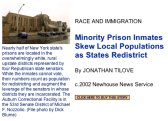Fixing prison-based gerrymandering after the 2010 Census: Louisiana
50 State Guide, March 2010
- Sections
- Impact at the state level
- Impact at the local level
- Louisiana law says a prison cell is not a residence
- Other solutions
- Additional resources
Prison-based gerrymandering violates the constitutional principle of “One Person, One Vote.” The Supreme Court requires districts to be based on equal population in order to give each resident the same access to government. But a longstanding flaw in the Census counts incarcerated people as residents of the prison location, even though they can’t vote and aren’t a part of the surrounding community.
When legislators claim people incarcerated in their districts are legitimate constituents, they award people who live close to the prison more of a say in government than everybody else.
Impact at the state level:
- House Districts 18 and 98, drawn after the 2000 Census, were each about 14% incarcerated, giving each group of 86 actual residents of the district as much influence as 100 residents in any other district in the state.
- Senate District 28, drawn after the 2000 Census, was more than 6% incarcerated, giving each group of 94 actual residents of the district as much influence as 100 residents in any other district in the state.
Impact at the local level:
- The West Feliciana Parish Police Jury and the school boards in Iberville and Evangeline Parishes avoided prison-based gerrymandering after the 2000 Census by excluding the prison population prior to drawing districts. In Ibverville’s case, including the prison population would have meant drawing a district that contained only two voters.
- More research needs to be done, especially in the Police Juries, County Councils and school boards for the following parishes: Allen, East Carroll, Iberville, Winn Parish, East Feliciana, Tensas, Avoyelles, Claireborne, West Caroll, and Madison. (These parishes contain large prisons relative to their actual population.) Unless the prison populations were removed from the redistricting base after the last Census, these communities have one or more districts that are significantly padded with non-resident prison populations. See the Democracy Toolkit for a suggested research methodology.
- The construction of new federal prisons in Grant and La Salle Parishes over the last decade mean that those parish will have to face the possibility of prison-based gerrymandering for the first time after the 2010 Census. Those parishes should remove the prison populations prior to redistricting.
Louisiana law says a prison cell is not a residence:
- “For purposes of the laws governing voter registration and voting, ‘resident’ means a citizen who resides in this state and in the parish, municipality, if any, and precinct in which he offers to register and vote, with an intention to reside there indefinitely.” (Louisiana Annotated Revised Statutes § 18:101(B).)
Other Solutions:
- All Louisiana municipalities that contain prisons should adopt similar solutions to the West Feliciana Parish Police Jury and the school boards in Iberville and Evangeline Parishes, which already base their districts on actual, not prison populations.
- Ideally, the U.S. Census Bureau would change where it counts incarcerated people. They should be counted as residents of their home — not prison — addresses. There is no time for that in 2010, but Louisiana should ask the Census Bureau for this change for 2020.
Additional resources:
 Minority Prison Inmates Skew Local Populations as States Redistrict by Jonathan Tilove, Newhouse News Service, March 12, 2002
Minority Prison Inmates Skew Local Populations as States Redistrict by Jonathan Tilove, Newhouse News Service, March 12, 2002- A list of new large prisons built in Louisiana since the 2000 Census. These prisons are likely to create new prison-based gerrymandering problems after their populations are counted in the 2010 census.
 Minority Prison Inmates Skew Local Populations as States Redistrict
Minority Prison Inmates Skew Local Populations as States Redistrict


